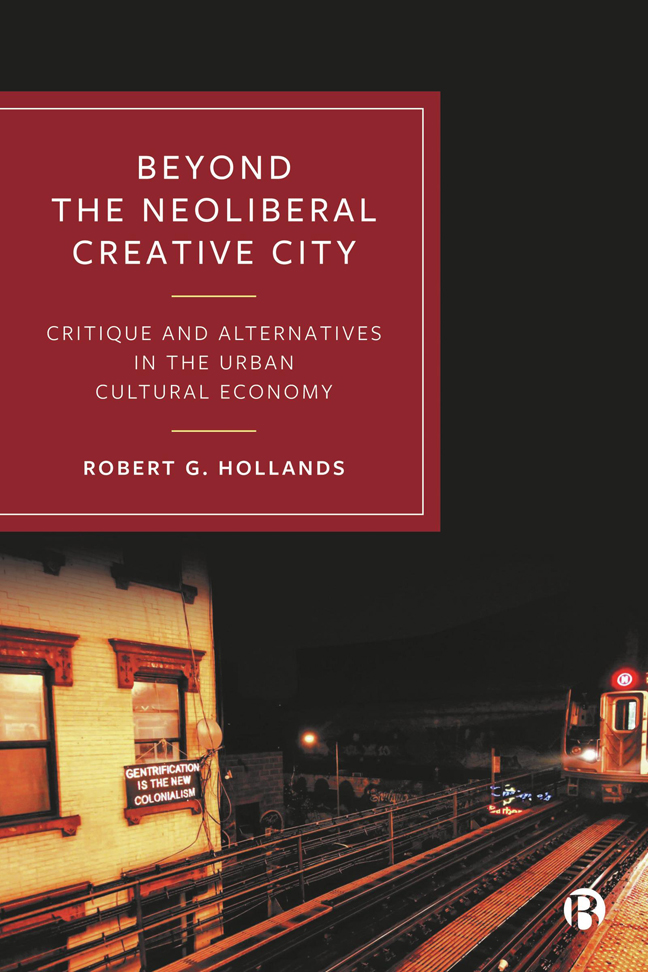Book contents
- Frontmatter
- Dedication
- Contents
- List of Figures, Tables and Case Studies
- About the Author
- Preface
- 1 Neoliberalism, Creativity and Cities
- 2 Urban Entrepreneurialism: The Emergence of the Cultural Economy
- 3 Critiquing the Neoliberal Creative City: But Long Live Alternative Creative Spaces!
- 4 Urban Cultural Movements and Anti-Creative Struggles
- 5 Neoliberal Nightlife and its Alternatives
- 6 Rethinking the Tourist City: Contestation and Alternative Cultural Tourism
- 7 Creative Polarization, Division and Exclusion
- 8 Beyond the Neoliberal Creative City
- Notes
- References
- Index
2 - Urban Entrepreneurialism: The Emergence of the Cultural Economy
Published online by Cambridge University Press: 25 January 2024
- Frontmatter
- Dedication
- Contents
- List of Figures, Tables and Case Studies
- About the Author
- Preface
- 1 Neoliberalism, Creativity and Cities
- 2 Urban Entrepreneurialism: The Emergence of the Cultural Economy
- 3 Critiquing the Neoliberal Creative City: But Long Live Alternative Creative Spaces!
- 4 Urban Cultural Movements and Anti-Creative Struggles
- 5 Neoliberal Nightlife and its Alternatives
- 6 Rethinking the Tourist City: Contestation and Alternative Cultural Tourism
- 7 Creative Polarization, Division and Exclusion
- 8 Beyond the Neoliberal Creative City
- Notes
- References
- Index
Summary
This chapter forms an important theoretical backdrop for explaining why contemporary neoliberal cities have shifted their accumulation regimes towards developing their cultural economies. It illuminates how many of the main problems created by urban entrepreneurialism end up getting reproduced in the creative city (Florida, 2004; 2014). The chapter draws primarily on the Marxist work of David Harvey. It argues that Harvey's (1989a) analyses of the shift from urban managerialism to entrepreneurialism provides a powerful explanation for the emergence of the capitalist urban cultural economy. It also provides a useful template for critiquing the limits of the neoliberal creative city (see Chapter 3).
The chapter begins with a summary of Harvey's general work on understanding the neoliberal city and looks at how he utilizes Marx's theory of capitalist accumulation for understanding urban development. It then turns more specifically to his notion of urban entrepreneurialism. Particularly relevant are governance strategies for developing the ‘spatial division of consumption’ in cities – namely the idea of producing urban advantage though enabling the cultural and creative economy. In addition to analysing the features and contradictions of the entrepreneurial city and providing some varied case study examples, the chapter also assesses the value of Harvey's position. In doing so it explores the degree to which we can envisage thinking beyond entrepreneurial models. Examples of this include considering ‘green entrepreneurialism’ (Ersoy and Larner, 2020), participatory alternatives afforded through what has been called the ‘new municipalism’ (Thompson, 2020) and a discussion of the ‘Fearless Cities Network’ (Barcelona En Comú, 2019; Russell, 2019).
David Harvey: capital accumulation and urban Development
David Harvey is a hugely respected and well-cited human geographer who is known for his substantial Marxist work on the political economy of cities. He has been writing about the city for over 50 years now. One of his early books was called Social Justice in the City (1973) and exemplifies one of Harvey's lifetime concerns. Over the course of his academic career, Harvey has written a spate of books on capitalism and the city (Harvey, 1985a; 1985b; 1989c; 1996, among others), including various works on political resistance to this urban form (Harvey, 2000; 2012). He also wrote a short, but key, book on the history of neoliberalism (Harvey, 2007) and a masterful critique of postmodernism (Harvey, 1989b).
- Type
- Chapter
- Information
- Beyond the Neoliberal Creative CityCritique and Alternatives in the Urban Cultural Economy, pp. 24 - 43Publisher: Bristol University PressPrint publication year: 2023



